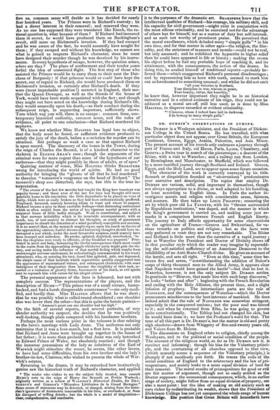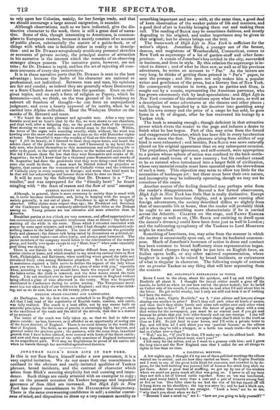DR. DURBIN'S OBSERVATIONS IN EUROPE.
Dn. Demons is a Wesleyan minister, and the President of Dicken- son College in the United States. He has travelled, with what particular object does not appear, over Great Britain, the European Continent, Greece, Egypt, Arabia, Palestine, and Asia Minor. The present account of his travels only embraces ajourney through part of France and Italy, via Havre, Paris, Lyons, Chambery, and Geneva ; a Swiss tour in search of the picturesque ; a descent of the Rhine, with a visit to Waterloo ; and a railway run from London, by Birmingham and Manchester, to Sheffield, which was followed by a more ramified journey through Scotland and Ireland. Greece, Egypt, and the Holy Land, are to appear upon some future occasion.
The character of the work is correctly conveyed by its title. Remark or disquisition founded on "observations" predominates over narrative and description. The topics that employ Dr. DUBBIN are various, solid, and important in themselves, though not always appropriate to a divine, or well adapted to his handling, at least according to English ideas. In Paris the author in- vestigates morals and religion with considerable sense, fairness, and acumen. He then takes up Louis PHILIPPE; censuring the art by which poor old LA FAYETTE, with his "throne surrounded by Republican institutions," was duped, and the manner in which the King's government is carried on, and making some just re- marks in a comparison between French and English liberty. The journey to Italy affords opportunity for some observations on the agriculture of France—Geneva and Switzerland, for va- rious remarks on politics and religion ; but as the facts were only gathered en route they are not very remarkable. The Rhine and Holland is little more than the narrative of a rapid journey ; but at Waterloo the President and Doctor of Divinity shows off in that peculiar style which the reader may imagine by superadd- ing the self-satisfied sufficiency of an American Democrat to the infallibility of an Anti-State-Church divine. He gives an account of the battle, and sets all right. "Even at this time," some time be- tween five and seven, " notwithstanding the addition of Bulow'a corps of thirty thousand men to the Allied Army, it appears clear that Napoleon would have gained the battle"—but that he lost it- Waterloo, however, is not the only subject Dr. DUBBIN settles. In gratitude to "Heaven, that made him with such large discourse," he looks " before and after" ; beginning with the French Revolution and ending with the Holy Alliance, the present time, and a slight infusion of prophecy. The intermediate parts are the rule of NAPOLEON, and the consequences of Waterloo—which the Doctor pronounces mischievous to the best interests of mankind. He does indeed admit that the rule of NAPOLEON was somewhat stringent, especially in the conquered nations; but the poor soul was forced to it ; and when he returned from Elba, he was going to govern quite constitutionally. The Ethiop had not changed his skin, but he would have done it; we have the Professor's word for that. The tone of all this part is Dr. Demurs's, but the matter is old.and pretty nigh obsolete—drawn from Whiggery of -five-and-twenty years old, and Voices from St. Helena.
The discussions on England relate to religion, chiefly among the IN'esleyans, and to the political or social condition of the people. The account of the religious world, so far as Dr. Durum( saw it, is succinct and informing ; though his bias for the Voluntary princi- ple, and the overturning of all churches opposed to that view, (which scarcely seems a sequence of the Voluntary principle,) is plumply if not needlessly put forth. He traces the evils of the social condition of England to the aristocracy and the law of pri- mogeniture, and mainly looks to a more equal division of land for their removal. The moral results of primogeniture for good or evil are fair matter of argument, though not so easily settled as the Doctor supposes : the economical consequences, which, in an earlier stage of society, might follow from an equal division of property, are also a moot point : but the idea of making an old society such as ours richer by redistributing its wealth, shows that the President of Dickenson College has not yet conquered the whole range of human knowledge. His position that Great Britain will ,henceforth have
to rely upon her Colonies, mainly, for her foreign trade, and that we should encourage a large annual emigration, is sounder.
Although observations, such as we have indicated, give the dis- tinctive character to the work, there is still a great deal of narra- tive. Some of this, though interesting to Americans, is common- place to European readers, because it merely consists of an account of public places, substantially the matter of a guide-book, or of things with which one is familiar either in reality or in descrip- tion : and as Dr. Duanns scrupulously avoids any personal sketches or accounts of private society, the principal source of attraction in his narrative is the interest which the remarks of an observing stranger always possess. The narrative parts, however, are not trite ; for Dr. Doantsi is rapid, and has the art of rejecting all com- mon accounts of every-day occurrences. It is in these narrative parts that Dr. DUBBIN is seen to the best advantage; the faults of his character are national or professiona, not individual. Between man and man, his opinions are fair and candid; as indeed they are generally where Democracy or a State Church does not enter into the question. Even on reli- gious topics, and on such a form of religion as Popery, which be denounces—and, we think, on the true ground of its tendency to subvert all freedom of thought—he can form an unprejudiced judgment, and even a hearty approval of its merits, when he is carried into Alpine solitudes. Hear the Wesleyan Doctor on the monks of St. Bernard and mass.
" We found the monks pleasant and agreeable men. After a very com- fortable meal and an hour's chat by the fire, we were shown to our chambers, and slept well, after a fatiguing day, on the good clean beds of the convent. Next morning we rose early, in time to attend mass in the chapel. Within, the tones of the organ were sounding sweetly, while without, the wind was howling over the snow-clad mountains as it does on the wild December nights at home. How beautiful it was—the worship of God on this dreary mountain- top! Ifelt its beauty, as I listened to those deep organ-tones, and heard the _solemn chant of the priests in the mass ; and I honoured in my heart these imly men, who devote themselves to this monotonous and self-denying life in order to do good, in the spirit of their Master, to the bodies and souls of men. Nor did I honour them the less that they were Romanists and monks of St. Augustine; for well I knew that for a thousand years Romanists and monks of St. Augustine had done the good deeds that they were doing—and that when none else could do them. A man must be blinded indeed by prejudice or bigotry, that cannot see the monuments of Catholic virtue and the evidences of Catholic piety in every country in Europe; and worse than blind must he be that will not acknowledge and honour them when he does see them."
It will be seen by the following that Dr. DURBIN is a " Tee- totaller," and was unprepared for the "friendly bowl" he found mingling with " the feast of reason and the flow of soul" amongst SERIOUS SOCIETY IN ENGLAND.
Although, in general, there is more ceremony in society than is usual with my it never becomes troublesome, and, being in keeping with the usages of society generally, is not out of place. Precedence in age or office is rigidly observed. Office claims more respect than age; the President and Secretary of the Conference being as commonly addressed by their titles as the Bishops among us. Young persons are less obtrusive and more attentive than in America.
Breakfast-parties at ten o'clock are very common, and afford opportunities of less ceremonious and more agreeable intercourse than at dinner ; the ladies re- maining all the while in the room. Those which I attended concluded with prayer by some aged minister, and with (what I had thought antiquated) sub- scribing names in the ladies' albums. The tone of conversation was generally lively and pleasant ; the dinner-talk being varied by discussions on political, re- ligious, and social topics—not often heavy, and always good-humoured. The junior members of the company would listen to the conversation of the nearest group, and hardly ever spoke except to cry " Hear, bear!" when some especially
good thing was saying. * • •
There is one feature in which these parties differed from any we have in similar circles at home, and which recalled to my mind my earliest visits to New York, Philadelphia, and Baltimore, when sparkling wines graced the table and circulated freely even among Methodist preachers. So it is still in England. It sometimes required a little nerve to decline the request of the lady whose guest you were, to "have the pleasure of a glass of wine with you," especially when, according to usage, you should have made the request of her. After the ladies retire, the cloth is removed, and the wine moves round the table freely. I do not recollect ever to have preached a sermon in England without being offered a glass of wine afterward in the vestry. Wine was frequently distributed in Conference during its active session. The Temperance move- ment has not taken hold of our brethren in England ; and they see wine-drink- ing, not as we do now, but as we did twenty years ago.
ENGLISH STAGE-COACHES AND LANDSCAPES.
At Darlington, for the first time, we embarked in an English stage-coach. All that I had read of the superiority of English roads, coaches, and cattle, was fully realized. The coach is a neat affair, not by any means built on scientific principles, for the centre of gravity is alarmingly high ; but yet, such is the excellence of the roads and the skill of the drivers, that this is a matter of no account. • • • •
The inside of the coach was fully taken up, so that we had to take our places outside : no loss, however, as it afforded us an opportunity of seeing one of the finest districts of England. There is no rural scenery in the world like that of England. The fields, as we passed, were ripening for the harvest, and groaned under the precious grain ; the pastures, with the same deep, luxuriant growth that I have before noticed, were covered with herds of the finest cattle; and now and then appeared one of the noble mansions of England imbosomed in its magnificent park. Well may an Englishman be proud of his native isle when he travels through her unrivalled agricultural districts.



























 Previous page
Previous page